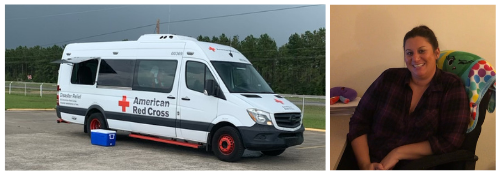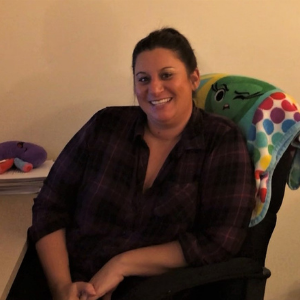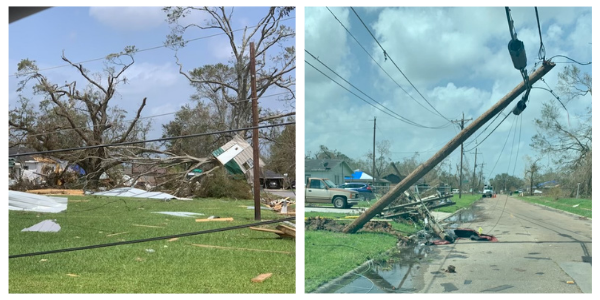
In late August, as Hurricane Laura was barreling toward Lake Charles, Louisiana, PACES outpatient therapist Megan Hogan was packing her bags to respond with the American Red Cross. For the past four years, Hogan has served as a disaster mental health volunteer.
Hogan spent two weeks working in Louisiana after Hurricane Laura hit. She was among the first wave of volunteers to arrive and was one of just six disaster mental health volunteers trying to serve 10,000 evacuees. Her first priority was to help meet their basic needs.

“You can’t expect someone to rationally walk through and problem solve with you when they’re hungry, they have no clothes, they have no idea where their family is, they have no place to live,” says Hogan.
In the early days of her deployment, Hogan was focused on handing out supplies, connecting evacuees with needed resources, helping them get their medications and just talking to people and letting them tell their story, if they were ready to do so.
Hogan says responding to disasters like Hurricane Laura and Hurricane Harvey have taught her valuable lessons about empathy and understanding that have helped her in her position at PACES.
“Learning to really validate how they feel in that moment has made me better at what I do because I can try to put myself in their shoes. I’ve learned to be patient and understand that someone may not always be in a place to discuss what they’re feeling.”

Hogan says the main difference in providing mental health services in a disaster zone compared to providing services at PACES comes down to whether basic needs are met.
“That’s one of the reasons why PACES works so hard to make sure that we have clothing closets and those sorts of things because how do we do therapy with clients who are starving? We have snacks all the time. Our offices are all comfy and cozy and we have blankets because we want our kiddos to feel safe.”
While she admits it may sound odd, Hogan says responding to disasters with the American Red Cross is her version of self care. She says she has met phenomenal people on her deployments and those connections keep her coming back.
However, deploying to disaster zones comes with a mix of emotions. While the work is rewarding, Hogan says there have been plenty of times when she’s had to go sit in a car and cry because it was overwhelming and she wished she could do more to help.
In the aftermath of Hurricane Laura, Hogan met a woman whose son had passed away in Hurricane Katrina. Hogan sat with that woman for hours, letting her cry and tell her story. Hurricane Laura was happening on the anniversary of when the woman’s son passed away, which meant she wasn’t able to do a balloon release, which had become her family’s way of celebrating his life.
“So I went to Party City and got some balloons and I brought them back to her,” Hogan recalls. “I tied them to her door and just said ‘hey, if you and your daughter want to do a balloon release, there’s some balloons on your door.’”
“It’s those little things that don’t take much effort or energy that mean a lot to somebody. It doesn’t have to be some sort of monumental thing that you do. Just be present with people.”
A couple weeks after Hogan returned to Kansas City, she received a text message from that woman thanking her for being present with her and listening to her.
“It’s those little things that don’t take much effort or energy that mean a lot to somebody. It doesn’t have to be some sort of monumental thing that you do. Just be present with people.”
At the end of the day, Hogan says acts of service are how she shows love.
“It feels good to do those things and it doesn’t feel like work to me.”
